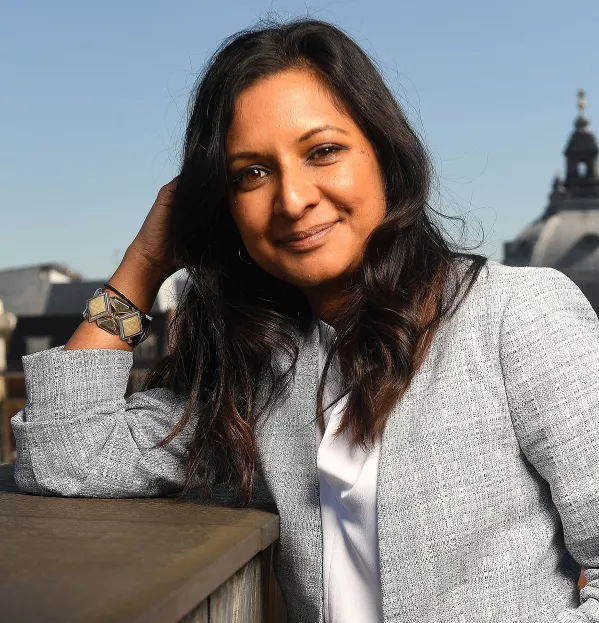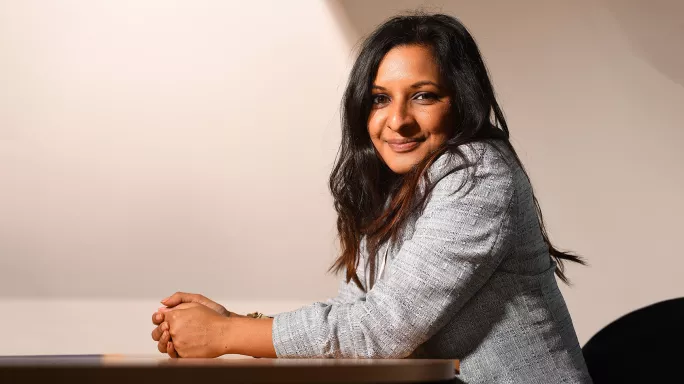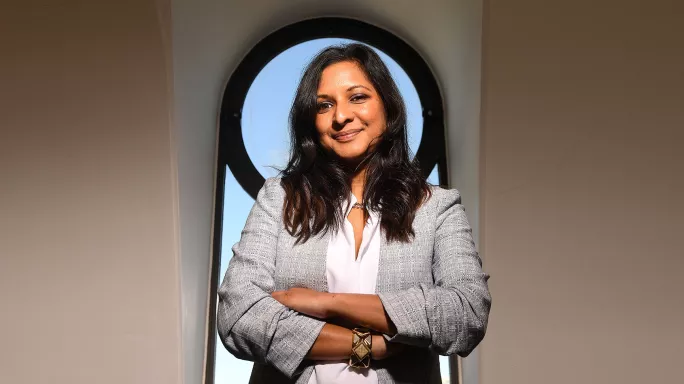- Home
- Leadership
- Staff Management
- 10 questions with... EPI chief Natalie Perera
10 questions with... EPI chief Natalie Perera

Natalie Perera is CEO of the Education Policy Institute, an independent research institute that she co-founded in 2016.
She has worked for the Department for Education, where she led on research and policy interventions, including on narrowing the gap between disadvantaged children and their peers and reform of the school funding system. She has also spent time in the Cabinet Office, where she worked in the Deputy Prime Minister’s Office.
- More from Tes’ 10 questions: Shadow education secretary Bridget Phillipson
- Sam Twiselton, director of Sheffield Institute of Education
- Colin Bell, chief executive of COBIS
Here, she chats to Tes for our 10 questions series, talking about her own time in education, what she values most about her role now, what she’d change if she ran education in the country and why she loves getting out and about to meet teachers across the country.
1. Who was your most memorable teacher at school?
I have two most memorable - for very different reasons. The first one was memorable for a great reason. His name was Mr Gaszczyk and he was my geography teacher. His lessons were really engaging and he was really larger-than-life character and I just really enjoyed his lessons. He also coached the all-boys school cricket team.
But because I rebelled against everything, I had prepared this big long speech to give him saying that it wasn’t fair there only being a boys’ team, and no girls could play and so on.
But I got as far as, “Mr Gaszczyk, it’s really unfair that girls can’t play for the boys’ team...,” and he said, “Natalie, if you want to try out for the teams, come along to nets after school.”
So I never got to rehearse my first kind of pro-feminist speech. But it was really encouraging and he didn’t really succumb to my rebellious streak, he just went with it, which was really nice.
And then the other teacher was my A-level form tutor, who was also my A-level English tutor - who was memorable for a very different reason.
When I was 17, in the first year of my A level, my mum very suddenly died during half-term.
So I went into college on the first day back and I told my form tutor that my mum had died and he looked at me and said, “Follow me.” He didn’t say, “I’m really sorry, are you OK?” or anything like that. He just said, “Follow me.”
Then he marched me to student services, said to the receptionist, “This pupil’s mother has died,” and said, “Wait here and they’ll deal with you.” And that was the extent of the care and compassion he showed me.
Not long after that, in my English class, I wrote an essay about the grief I felt after losing my mum, and his feedback on that essay was that it was cliché-ridden.
I still remember that because it was so hurtful, it was so upsetting. I hope now that the support teachers offer to young people when it comes to their wellbeing has vastly improved.
2. What were the best and worst things about your time at school?
I was a massive bookworm, so having a few hours of class time every week to just read and talk about stories and literature to me didn’t feel like being in school.
The first text we did when I joined secondary in Year 7 was I Know Why the Caged Bird Sings by Maya Angelou, and what an extraordinary book to start your secondary curriculum with - it really stuck with me.
For the worst times, though, I was bullied, on and off during primary and secondary. And again, we’re going back to the late 80s, early 90s when bullying wasn’t treated as seriously as it is now.
So, for me, not only was it a difficult thing to experience but again also the attitude of some of the teachers of “oh, just ignore them” and “in one ear and out the other” was not a helpful solution.
3. Why do you work in education?
I originally wanted to be a teacher and I actually applied to do a primary teaching degree at university, but then I didn’t end up going to university for personal reasons.
So instead, not long after I finished my A levels, I was working in a finance company and then I got the opportunity to go and work at a very junior level in the Department for Education.
And I thought that would be a great opportunity because it’s kind of one step closer to working in the interests of children and young people - certainly closer than the kind of finance job I was doing.
I ended up working in the DfE for about 12 years and I really enjoyed it. But then I left to set up EPI in 2015 and that was a really brilliant opportunity for me to focus on what really mattered to me, which was a focus on evidence for how to improve outcomes for young people.

4. What are you proudest of in your career? And what do you regret?
I’m definitely most proud of establishing the EPI.
It started off as an idea that [former Liberal Democrat MP and former schools minister] David Laws and I had and we were very fortunate that, in 2015, our chair of trustees, Sir Paul Marshall, gave us the financial support to develop it.
I’m really proud that six years later the EPI has had an incredible impact in terms of building evidence, having a voice in the public domain - the team has achieved an incredible amount.
On the regrets side, I would say when I was a civil servant in the DfE I was working on the 2010 spending review and although I was still relatively junior at the time, I regret that I didn’t fight harder against some of the cuts that happened to early years and children’s services.
We can see now the impact those cuts have had on frontline services and in young people’s outcomes.
5. Who would be your colleagues in your perfect school staffroom?
Well, obviously, my current team. I know that sounds cheesy but I do have a phenomenal team at EPI and they are the ones that produce the groundbreaking and impactful research and make sure that it is disseminated amongst policymakers and the sector and government.
6. What are the best and worst aspects of our school system today?
What we’ve seen over the last couple of years is the resilience of schools being truly inspirational.
They’ve worked, despite all of the tough challenges, very innovatively to keep teaching and learning going but also to ensure that the wider needs of children are met, such as getting free school meals out to pupils when the government was umming and ahhing and couldn’t get vouchers out in time and so on.
On the worst side, I think it is the growing disadvantage gap we’re seeing between disadvantaged pupils and their peers because not only are we seeing the gap in attainment growing, we know that disadvantaged pupils are also more likely to be excluded, more likely to be subjected to a managed move and that provision for other types of vulnerable pupils like those with SEND is very patchy and under-resourced.
7. What would you do if you became education secretary tomorrow?
I think the first thing I would do is instigate a cross-government child poverty strategy because we know that poverty has such a profound effect on outcomes.
I would also increase funding in the early years to improve access and quality for the most disadvantaged children.
I’d also instigate a review of school admissions. I don’t think there are any easy answers to admissions but, equally, I don’t think it’s fair that in many cases where you can afford to live or house prices determine which school you end up going to.

8. What will our schools be like in 30 years’ time?
I don’t think they will look massively different to how they are now but I do hope we have a more holistic focus on pupils’ wellbeing and inclusion and early intervention.
I think we’re making progress but I’d hope that in 30 years’ time it’s much more a kind of embedded part of what we think of when we think about school.
I also think online learning is a really interesting area as well - we’ve seen it expand massively in the pandemic and, while I definitely don’t think it should, or will, replace day to day teaching, it does bring some really interesting opportunities for learning, typically when schools have closed due to adverse weather conditions or if a pupil can’t physically get to school for a period of time.
9. Who has made the biggest difference to education in the past 12 months?
In terms of individuals outside the classroom, I think [Manchester United and England footballer] Marcus Rashford had a massive impact on getting extra support to disadvantaged pupils, while [former education recovery commissioner] Sir Kevan Collins showed real inspirational integrity in championing the needs of pupils.
And I really like what Dame Rachel de Souza is focusing on at the moment in her role as children’s commissioner, and one of the first things she did was actually to listen to the voice of the child through the Big Ask survey and used the findings from that to focus on really important issues around mental health and wellbeing and also climate change, which I really like.
10. What are the most important lessons you’ve learned doing this job?
I think there are three important lessons I’ve learned.
The first is to make sure that my staff and stakeholders feel genuinely valued because without their cooperation and collaboration and hard work the EPI wouldn’t be successful.
Secondly, it is to listen to the views and experiences of others - for me, it’s really important to take the time to visit schools, meet with people on the front line, including young people as well, in order to avoid working in a bubble.
The third thing is that while it’s important to listen to people and to take on board their views, you also cannot be afraid to take tough decisions. I think, as a leader, you have to be confident and comfortable trusting your own experience and your own expertise.
And you need to be accountable for those decisions, and the way I look at things in leadership is that the success belongs to all of us - to everyone - but the failures are mine alone.
I think that is a really important mantra to carry with you as a leader.
Natalie Perera was talking to Dan Worth
You need a Tes subscription to read this article
Subscribe now to read this article and get other subscriber-only content:
- Unlimited access to all Tes magazine content
- Exclusive subscriber-only stories
- Award-winning email newsletters
Already a subscriber? Log in
You need a subscription to read this article
Subscribe now to read this article and get other subscriber-only content, including:
- Unlimited access to all Tes magazine content
- Exclusive subscriber-only stories
- Award-winning email newsletters



